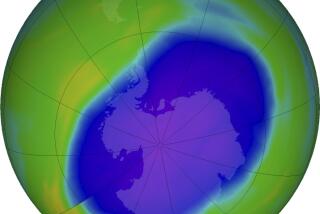Developments in Brief : Don’t Look Now, but the Sun Isn’t Shining Quite as Brightly These Days
- Share via
You may not have noticed, but the sun has lost one-thousandth of its brightness since 1980, according to scientists analyzing data gathered by three monitors aboard the Solar Maximum Mission satellite, which observed the sun without interference from the atmosphere.
The researchers believe that the temperature drop has stopped and that it was related to the 11-year activity cycle of sunspots--the dark, relatively cool areas that appear on the sun’s surface where magnetic forces prevent internal heat from moving outward.
The data showed that light radiated by the sun decreased 0.1% from early 1980 through mid-1985, but has remained constant since, said Richard C. Willson, a Caltech physicist at NASA’s Jet Propulsion Laboratory in Pasadena.
He said the drop in solar brightness since 1980 probably would be enough to reduce Earth’s temperature by one-fifth to two-fifths of a degree. But Willson said the loss of sunshine may have been offset by the greenhouse effect, in which gases from industrial society warm the Earth by trapping heat, much like glass panes in a greenhouse.
“There’s nothing to indicate that the sun’s output would continue to drop precipitously for a long enough period to cause major climate changes like ice ages,” said Willson, whose findings are being published in the current issue of Science magazine.
Co-author Hugh Hudson, a UC San Diego solar physicist, said the loss of solar brightness “is either a change that will go on forever and kill us or a cyclical change, which I believe it is since we’re alive to talk about it.”
Willson said he believes that the loss of solar brightness roughly coincides with a reduction of sunspots since the peak of the last cycle in late 1980. He and other scientists expect the sun will start regaining brightness by 1987 as sunspot activity starts to climb again toward another peak in 1990 or 1991.





